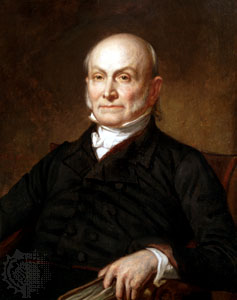
Oh, how we love our lists of Famous UUs. They stroke our egos. They remind us of how influential past UUs once were in society at large, and they kinda sorta suggest that either we still could be, or at least still have the moral rectitude to deserve to be, just as influential today. We enjoy basking in their reflected glory.
Such lists are often topped by John and John Quincy Adams, two of the four (arguably five, if you include Thomas Jefferson) Unitarians who have become President of the United States. While President, Adams the father signed the Treaty of Tripoli, which declared that the US is not a Christian nation, and which was unanimously ratified by the Senate. After stepping down as President, Adams the son argued and won the
Amistad cases, freeing a shipload of mutinous African slaves. That's some mighty righteous UUing, right there.
But a disturbing quality I find in UU hagiography is that it often revises the portraits of our saints to more closely resemble who we would have liked them to be than who they actually were. For example, we like to claim the Adamses as our co-denominationalists, but when you look at them more closely, their religion wasn't one that many of us would want to claim as our own. Yes, they were accomplished politicians and did some things in that field that we still admire today, but few UUs today know that they were also devoutly religious, not in any modern "UU" sense but in the old New England Congregationalist mold, and that John Quincy Adams in particular produced a fairly weighty
oeuvre of religious writing that included a new metrical translation of the Psalms for singing in church to replace the older Bay and Scottish psalters.
Here's a stanza from his setting of Psalm 14 that I had to find on a Baptist church's website, because it doesn't appear anywhere in
Singing the Living Tradition or
Singing the Journey. I think it's obvious why not:
The fool denies, the fool alone,
Thy being, Lord, and boundless might,
Denies the firmament, Thy throne,
Denies the sun’s meridian light;
Denies the fashion of his frame,
The voice he hears, the breath he draws;
O idiot atheist! to proclaim
Effects unnumbered without cause!When we dismiss and ignore, rather than engage and wrestle with, this sort of challenging material from our denominational past, do we gain or lose?
I think we lose when we bury and forget those parts of our religious heritage we can no longer affirm. They can still serve as a reminder of the crucible of issues that made us who we are today, and help us frame
issues that each generation needs to confront afresh in order to pursue a complete, rigorous and truly "free and responsible search for truth and meaning".


